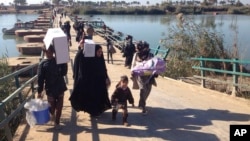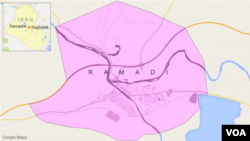Hundreds of civilians are trapped in central Ramadi, squeezed between Islamic State extremists who have booby-trapped the building around them and Iraqi Security Forces (ISF) fighting to retake control of the western city.
Brett McGurk, the U.S. official in charge of the coalition against IS, told journalists in Baghdad that the extremists were “taking human shields as hostages.”
“It is the poorest and most vulnerable who are trapped because they did not have the means to leave earlier,” UNHCR representative Bruno Geddo told VOA via telephone from Baghdad.
Geddo said for the last 10 days Iraqi forces have been dropping leaflets on the city advising civilians to leave and head south to an area under Iraqi control.
But fleeing the city has been difficult. According to reports, IS has threatened those who try to leave and booby-trapped a lot of buildings in the city center.
Many people are reportedly paying bribes in order to escape.
“Our information is that those who manage to escape from the city center, where they are trapped by IS, will leave one by one. This is the more plausible option, so there will not be a big outflow,” Geddo said.
According to the UNHCR, there are already some 10,000 displaced Iraqis in Anbar province in camps bordering Baghdad, and another 90,000 displaced Iraqis in Baghdad itself. Ramadi is roughly 125 kms west of the capital.
Airstrikes continue
A spokesperson for the U.S. military's Operation Inherent Resolve told VOA via Twitter that the ISF now controls many locations on both sides of the city, which is divided by the Euphrates river.
U.S. airstrikes in support of the Iraqi Forces in Ramadi continued Wednesday, hitting large IS tactical units, vehicles, command-and-control centers and bomb factories.
The spokesperson said the “precision airstrikes strive to protect civilians” in the area.
Defense Secretary Ash Carter said Wednesday the U.S. was ready to send in attack helicopters and “accompanying advisors” to help the ISF retake the city, if requested by Iraqi Prime Minister Haider al Abadi.
Regaining control of Ramadi would be a major success for the Iraqi forces, which have been criticized for allowing IS to over-run the city in May.
Taking a 'long time'
The government vowed at the time to retake the city within days, but Carter acknowledged to Congress Wednesday that it has taken a “frustratingly long time” for Iraqi forces to regain the territory.
Clearing the city of booby trap bombs and holding the ground from Islamic State could still prove challenging for the ISF. “These things take time,” coalition envoy McGurk said.
McGurk on Wednesday met with the governors of both Anbar and Ninewa provinces to review stabilization plans for Ramadi and Mosul. Mosul remains firmly in the hands of Islamic State militants.
Under fire from Republican lawmakers Wednesday, Carter defended the U.S. strategy against IS in both Iraq and Syria which has been based on a campaign of targeted airstrikes, recently boosted with U.S. Special Forces on the ground.
The U.S. has 3,500 troops in Iraq in six different locations in support of Iraqi Security forces, Carter said. Washington has also sent a special expeditionary task force to conduct raids in Syria.
Carter pushed back against lawmakers who called for more boots on the ground.
Sending large numbers of U.S. combat troops to fight the Islamic State would “Americanize” the fight and “turn those fighting ISIL or inclined to resist their rule into fighting us instead,” Carter warned.






